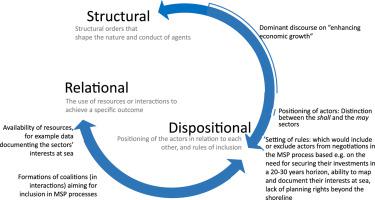当前位置:
X-MOL 学术
›
Ocean Coast Manage.
›
论文详情
Our official English website, www.x-mol.net, welcomes your feedback! (Note: you will need to create a separate account there.)
Mechanisms of power in maritime spatial planning processes in Denmark
Ocean & Coastal Management ( IF 4.6 ) Pub Date : 2020-12-01 , DOI: 10.1016/j.ocecoaman.2020.105367 P. Ramírez-Monsalve , J. van Tatenhove
Ocean & Coastal Management ( IF 4.6 ) Pub Date : 2020-12-01 , DOI: 10.1016/j.ocecoaman.2020.105367 P. Ramírez-Monsalve , J. van Tatenhove

|
Abstract In the EU setting, Maritime Spatial Planning (MSP) is portrayed as providing a framework for arbitrating between competing human activities and managing their impact on the marine environment. However, a maritime spatial plan cannot be considered a neutral or objective instrument to decide about conflicting claims between different maritime sectors and activities. MSP is a complicated process –far from neutral. To secure a more democratic decision-making process and promote a fairer distribution of the benefits derived from marine resources, these conflicting claims, the unequal division of resources, as well as the inclusion and exclusion of actors in maritime planning processes need to be explored and understood. From a starting point of a desk study, we constructed a typology of power and applied this framework to the development of MSP in Denmark. Our analysis shows that the capacity that actors have to secure a permitted use of the Danish sea within the current (2016–2019) MSP process is influenced by structural, dispositional and relational powers: (1) a dominant discourse of “enhancing economic growth” (a form of structural power) that define which topics are legitimate, resulting in a (2) dominant positioning of the sectors mentioned in article 5 of the EU MSP Directive, such as energy, transport, fishing, aquaculture, and extraction of raw materials, over other sectors: tourism, recreational activities, and outdoor life (a form of dispositional power); (3) the setting of rules e.g., prioritizing the securing of investments for certain sectors with a 20–30 years horizons (a form of dispositional power) which would include or exclude actors from negotiations in the MSP process; (4) the availability of data (a form of relational power) which would allow to document the sectors’ interests at sea, i.e., outdoor life and recreational activities; (5) the ability to form coalitions (a form of relational power) aiming to strengthen the position of a particular group of stakeholders in the MSP process, i.e., East Jutland coastal municipalities. The study shows that it is crucial to understand the different forms of power and power dynamics in MSP, and understand that the process can create winners and losers.
中文翻译:

丹麦海洋空间规划过程中的权力机制
摘要 在欧盟环境中,海洋空间规划 (MSP) 被描述为提供一个框架,用于在相互竞争的人类活动之间进行仲裁并管理其对海洋环境的影响。然而,海洋空间规划不能被视为决定不同海洋部门和活动之间的冲突主张的中立或客观工具。MSP 是一个复杂的过程——远非中立。为了确保更民主的决策过程并促进海洋资源收益的更公平分配,需要探索和探讨这些相互冲突的主张、资源的不平等分配以及将参与者纳入和排除在海事规划过程中的问题。明白了。从案头研究的起点,我们构建了一种权力类型,并将该框架应用于丹麦 MSP 的发展。我们的分析表明,在当前(2016-2019 年)MSP 进程中,参与者必须确保获得许可使用丹麦海的能力受到结构性、处置性和相关性权力的影响:(1)“促进经济增长”的主导话语(一种结构性权力)定义哪些主题是合法的,导致 (2) 欧盟 MSP 指令第 5 条中提到的部门的主导地位,例如能源、运输、渔业、水产养殖和原材料提取, 在其他部门:旅游、娱乐活动和户外生活(一种处置权力的形式);(3) 规则的设定,例如,优先确保某些部门在 20 至 30 年范围内的投资(一种处置权),这将包括或排除参与者参与 MSP 过程的谈判;(4) 数据的可用性(一种关系权力的形式)将允许记录海上部门的利益,即户外生活和娱乐活动;(5) 形成联盟(一种关系权力形式)的能力,旨在加强特定利益相关者群体在 MSP 过程中的地位,即东日德兰沿海城市。研究表明,了解 MSP 中不同形式的权力和权力动态,并了解该过程可以创造赢家和输家,这一点至关重要。(4) 数据的可用性(一种关系权力的形式)将允许记录海上部门的利益,即户外生活和娱乐活动;(5) 形成联盟(一种关系权力形式)的能力,旨在加强特定利益相关者群体在 MSP 过程中的地位,即东日德兰沿海城市。研究表明,了解 MSP 中不同形式的权力和权力动态,并了解该过程可以创造赢家和输家,这一点至关重要。(4) 数据的可用性(一种关系权力的形式)将允许记录海上部门的利益,即户外生活和娱乐活动;(5) 形成联盟(一种关系权力形式)的能力,旨在加强特定利益相关者群体在 MSP 过程中的地位,即东日德兰沿海城市。研究表明,了解 MSP 中不同形式的权力和权力动态,并了解该过程可以创造赢家和输家,这一点至关重要。东日德兰沿海城市。研究表明,了解 MSP 中不同形式的权力和权力动态,并了解该过程可以创造赢家和输家,这一点至关重要。东日德兰沿海城市。研究表明,了解 MSP 中不同形式的权力和权力动态,并了解该过程可以创造赢家和输家,这一点至关重要。
更新日期:2020-12-01
中文翻译:

丹麦海洋空间规划过程中的权力机制
摘要 在欧盟环境中,海洋空间规划 (MSP) 被描述为提供一个框架,用于在相互竞争的人类活动之间进行仲裁并管理其对海洋环境的影响。然而,海洋空间规划不能被视为决定不同海洋部门和活动之间的冲突主张的中立或客观工具。MSP 是一个复杂的过程——远非中立。为了确保更民主的决策过程并促进海洋资源收益的更公平分配,需要探索和探讨这些相互冲突的主张、资源的不平等分配以及将参与者纳入和排除在海事规划过程中的问题。明白了。从案头研究的起点,我们构建了一种权力类型,并将该框架应用于丹麦 MSP 的发展。我们的分析表明,在当前(2016-2019 年)MSP 进程中,参与者必须确保获得许可使用丹麦海的能力受到结构性、处置性和相关性权力的影响:(1)“促进经济增长”的主导话语(一种结构性权力)定义哪些主题是合法的,导致 (2) 欧盟 MSP 指令第 5 条中提到的部门的主导地位,例如能源、运输、渔业、水产养殖和原材料提取, 在其他部门:旅游、娱乐活动和户外生活(一种处置权力的形式);(3) 规则的设定,例如,优先确保某些部门在 20 至 30 年范围内的投资(一种处置权),这将包括或排除参与者参与 MSP 过程的谈判;(4) 数据的可用性(一种关系权力的形式)将允许记录海上部门的利益,即户外生活和娱乐活动;(5) 形成联盟(一种关系权力形式)的能力,旨在加强特定利益相关者群体在 MSP 过程中的地位,即东日德兰沿海城市。研究表明,了解 MSP 中不同形式的权力和权力动态,并了解该过程可以创造赢家和输家,这一点至关重要。(4) 数据的可用性(一种关系权力的形式)将允许记录海上部门的利益,即户外生活和娱乐活动;(5) 形成联盟(一种关系权力形式)的能力,旨在加强特定利益相关者群体在 MSP 过程中的地位,即东日德兰沿海城市。研究表明,了解 MSP 中不同形式的权力和权力动态,并了解该过程可以创造赢家和输家,这一点至关重要。(4) 数据的可用性(一种关系权力的形式)将允许记录海上部门的利益,即户外生活和娱乐活动;(5) 形成联盟(一种关系权力形式)的能力,旨在加强特定利益相关者群体在 MSP 过程中的地位,即东日德兰沿海城市。研究表明,了解 MSP 中不同形式的权力和权力动态,并了解该过程可以创造赢家和输家,这一点至关重要。东日德兰沿海城市。研究表明,了解 MSP 中不同形式的权力和权力动态,并了解该过程可以创造赢家和输家,这一点至关重要。东日德兰沿海城市。研究表明,了解 MSP 中不同形式的权力和权力动态,并了解该过程可以创造赢家和输家,这一点至关重要。



























 京公网安备 11010802027423号
京公网安备 11010802027423号